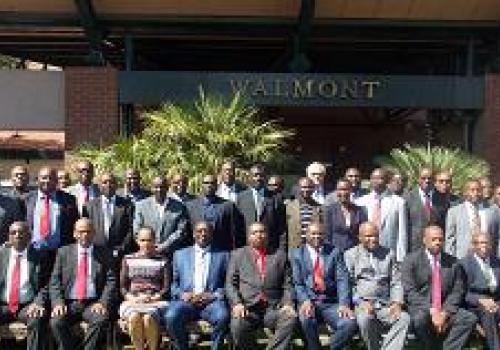In a quest to ensure that the Southern Africa Development Community (SADC) is ready and capable of fulfiling its Peace Support Operations (PSO) obligations, the SADC Secretariat held a 3-day Workshop on Enhancing the SADC Standby Force Post Full Operational Capability (Post-FOC) at the Grand Palm Hotel in Gaborone, Botswana from 15 to 17 March 2017.
The workshop was officially opened by the Acting Director of the Organ on Politics, Defence and Security Affairs, Mr. Maemo Machethe, on behalf of the Executive Secretary. In his opening remarks, Mr. Machethe stated that SADC, like other Regional Economic Communities and Regional Mechanisms (RECs/RMs), has the responsibility and commitment to uphold the aspiration of the Agenda 2063 of the African Union to “Silence the Guns by 2020”. He also noted that SADC has the primary responsibility of promoting peace, security and stability in Africa as part of the overall security framework of the African Peace and Security Architecture (APSA) and African Standby Force (ASF). In this regard, he reminded delegates that SADC Standby Force will be on ASF standby roster from January to June 2019 and thus is expected to provide effective Peace Support Operations (PSO) capabilities not only for the SADC Region, but also for the entire continent. He therefore urged participants to come up with concrete and workable modalities and plans on how the region will effectively operationalize this obligation.
The meeting, among other things, discussed the implications of SADC Standby Force (SSF) being on the African Standby Force (ASF) Standby Roster from January to June 2019; the Maputo Five Year Work Plan; the proposed establishement of the SSF Regional Movement Coordination Centre (RMCC)/Joint Operations Centre (JOC); the draft SSF Roster Model; the SSF Regional Logistics Depot (RLD) Concept; and Integrated Mission Planning (IMP).
The workshop observed that SSF policies and legal frameworks were outdated and in some instances not available. In this regard, the Secretariat was tasked to ensure that necessary policies and legal frameworks including SOPs, MoUs and SOFAs are available, updated and finalised for adoption during the 2018 MCO meeting. The workshop specifically directed the Secretariat to review the 2007 MoU that established the SSF to accommodate its multidimensionality including emerging and contemporary PSO dynamics.
The Secretariat’s recommendations regarding the implications of the SSF being on the ASF Roster; the domestication and implementation of the Maputo Five Year Work Plan and the establisment of RMCC and JOC were endorsed and recommended for submission to relevant SADC structures for approval. Member States also noted and welcomed the proposed establishment of the SADC Peace Fund which will provide readily available and predictable funding for SADC Peace Support Operations.
The workshop further recommended that the SSF Standby Roster be finalized and implemented with effect 1st July 2017 and that it should run for 6 Months on rotational basis. It was also recommended that the SSF should be composed of two forces whenever it is placed on the ASF Roster so that there is always a Force on standby to meet the SADC regional security needs. In addition, the workshop recommended that the SSF should conduct a readiness exercise in 2018 to ascertain the preparedness of its pledged capabilities.
Member states also re-confirmed their pledges made towards the SSF and undertook to conduct periodic self-verification of Pledges as well as confirm the readiness of the same in writing to the Secretariat bi- annually. MS also urged the Secretariat to work closely with National Focal Points in order to expedite recruitment process of Civilian experts to the African Standby Capacity (ASC) Roster.
The workshop was attended by delegates of multidisplinary representation including the military, police and civilian personnel from the Governments of Angola, Botswana, Lesotho, Malawi, Namibia, South Africa, Swaziland, Zambia and Zimbabwe.

